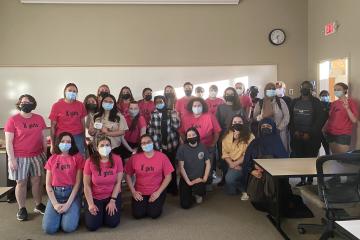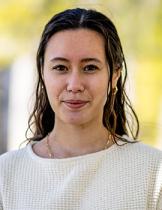
Diversifying economics, part four: Mentorship program development considerations

The central goal of J-PAL North America’s Economics Transformation Project (ETP) is to increase diversity within economics by supporting students from backgrounds historically underrepresented in the field. One key way in which ETP aims to do this is by addressing disparities in access to mentorship and networking opportunities during all stages of learning and advancement. In order to design a robust and beneficial mentorship program, the team reviewed existing evidence, pedagogy, and theory; and spoke to peer organizations to discuss considerations for mentorship programs. In the final post of our four-part series on the collaborations that shape ETP, J-PAL staff summarize the design of several mentorship programs in economics and discuss next steps for ETP.
Limited existing evidence on mentorship programs to increase diversity
Research from a variety of fields indicate that pathways programs can promote diversity by providing students with networking opportunities, skills, knowledge-building, and other resources at key stages throughout their education. For example, J-PAL affiliated researchers found that STEM summer programs for high school students led to an increase in attendance at prestigious universities and an increase in graduation rates. Another randomized evaluation indicated that mentorship workshops for women in economics increased the likelihood that the economists stayed in academia and received tenure from a highly-ranked school.
However, there is currently less evidence from randomized evaluations on the role that longer-term mentorship programs may play in diversifying STEM, economics, and related fields. These mentorship programs aim to set up ongoing relationships, beyond ad hoc support in a workshop or on a particular research project, and focus on advancing the mentee’s career and professional development.
In the absence of randomized evaluations, ETP is looking to learn from peer organizations such as the Minnesota Center for Diversity in Economics (MCDE), the Research in Color Foundation (RIC), and the Women’s Institute for Science, Equity and Race (WISER). Each of these organizations offer mentorship programs with a variety of thoughtful aspects that have positively influenced both students and their mentors.
Innovative approaches to mentorship programs
ETP staff spoke with leaders of MCDE, RIC, and WISER’s Inclusive Peer Onsite Distance program (IPODS) to learn more about the philosophy and components behind their established mentorship programs. Through these conversations, five common themes emerged:
- Centering the expressed needs of mentees and structuring the program to prioritize what is learned through mentee’s feedback, including personal statements or welcome surveys.
- Facilitating a two-way model of mentorship by reiterating that everyone involved is both a mentee and a mentor. Mentees and mentors can learn from each other.
- Building community and forging connections through a cohort or group-based model. Mentees can learn from each other as well.
- Providing access to skills-building opportunities for participants to engage in events such as trainings, workshops, and speaker series. Participants are also encouraged to apply what they learn at these events through group or individual projects.
- Offering financial support in the form of gift cards to compensate participants for their time or funds to cover graduate school application fees or professional development opportunities.
Many of the above themes are echoed in education scholarship on teaching, learning, and advising. This includes Django Paris and H. Samy Alim’s work on Culturally Sustaining Pedagogy (CSP), Alison King’s work on promoting active and cooperative learning, and Samuel D. Museus and Joanna N. Ravello’s work on characteristics of academic advising that best support students of color in predominantly white institutions.
Key aspects of mentorship programs in economics
Minnesota Center for Diversity in Economics’ (MCDE) Cross Generational Femxle Economist Mentorship Program (C-FEM)
MCDE, established in 2018, aims to increase gender and racial diversity in economics through skills-building workshops, collaborations with regional partners, and their mentorship program, C-FEM. C-FEM aims to support women and non-binary students through group mentorship.
Unique program features
- Group-based model: In a group-based model, students meet mentors at every stage of the pipeline, from high school to doctoral students, with a focus on students learning from each other and working as a team.
- Speaker series & action steps: Within their mentorship groups, students attend a speaker series and discuss topics including professional development, current economics research, and social justice causes. After each speaker, mentorship groups develop action steps that they work toward as a group, which range from social justice initiatives to professional development goals.
- Valuing the time of mentors & mentees: Upon completion of the action step, each student is given a gift card, which are available thanks to funding from the Women's Foundation of Minnesota. This gift card serves as both an incentive and an indication that MCDE values the time and effort of both mentors and mentees.
Program participant feedback
“I feel more confident in myself as a mentor and am ready to dedicate myself to mentorship in the long term and to seek out opportunities to empower others in the ways that others have empowered me.”
“C-FEM has made me realize how much I can positively influence other women and how much they do look up to me. It has also given me a new mentor!”
Interested readers can apply to be a mentor/mentee with MCDE here.
Research In Color Foundation (RIC)
RIC works to shift the status quo in economics by increasing the number of historically underrepresented scholars in economics and economics-adjacent fields, including public policy, political economy, and other similar quantitative social sciences. The RIC Mentorship Program is an eight-month personalized mentorship program with seasoned economists and quantitative social scientists who serve as mentors. Mentees conduct an independent research project of their own choosing with support from their mentor. Mentees produce a final paper and prepare a presentation for the annual Research in Color Conference. Mentees are also provided financial support for graduate school applications and other key learning opportunities throughout the program.
Unique program features
- Low barrier-to-entry: RIC has a low barrier-to-entry process, which does not include a set list of criteria (since these can be biased). Instead, the process considers every student holistically and reviews various application components, including personal statements, need, and interest in the program, to center mentees and ensure they have the best experience.
- Mentorship activities: Prospective PhD students are matched with established mentors, who are generally economists and quantitative social scientists, in a one-on-one, eight-month mentorship program. During this time, the mentees have a chance to work together with their mentor on an independent research project of their choosing and also receive:
- Targeted career advice
- One-on-one office hours with members of the RIC leadership team
- Access to RIC’s internal buddy system
- Access to a vast network of high-level economists
- Access to ad hoc workshops for mentees
- Individual mentor trainings, quantitative skills-building workshops, and writing workshops
- Direct adverts for Research Assistant and Pre-Doctoral positions
- Internships available upon completion of the mentorship program
- Mentor support for graduate school applications
- A $1,000 scholarship that can be used during the graduate school application process - Focus on mentees’ needs: This program uses a bottom-up approach to mentorship by centering the mentee throughout the entire process and focusing on providing mentees with a community. This is not often the case with research assistant and pre-doctoral positions, or other existing mentorship programs. To create a safe and supportive environment where mentees feel that they can be themselves, mentors are asked to shift their mentalities to acknowledge the power differential, positionality, and the importance of lived experience. Mentees’ backgrounds are not seen as obstacles; rather, they are experiential assets and the reasons why mentees will be successful.
- Mentorship as a skill: This program believes the point of mentorship is for mentors to provide mentees with the resources and training they have access to, and that even great mentors can improve this skill over time: “If you actually practice it, think about what you are doing, go in with the intention to be better and do better, and continuously work at it, you can be a great mentor.” -Chinemelu Okafor, Founder and President of RIC
Program participant feedback
"My time at RIC has been TRANSFORMATIVE. In less than two months, I've learned to use Latex, connected with senior economists at the World Bank and Institute for Fiscal Studies, leveled up my research skills through J-PAL sessions and learned how to design an RCT! From personalized mentorship to iterative support for competitive job applications, RIC has empowered me to ask inquisitive questions, claim my strengths, and remain a curious learner. All the doors that RIC is opening for me, I hope to keep open for more underrepresented yet courageous young economists/professionals!” - Daniela Maquera Sardon
“After only a few weeks of working with my mentor, I realize that my interest in economics is growing rapidly.
Between discussions and exchanges with other mentees in the buddy system, participating in panels co-hosted with J-PAL and the World Bank, and fruitful exchanges with mentors dedicated to guiding us, our understanding of economics keeps growing.
Happy to be part of this cohort!” - Doulo Sow
Learn more about how to become a mentor/mentee with RIC here.
Women's Institute for Science, Equity and Race's (WISER) Inclusive Peer Onsite Distance (IPOD) Mentoring Program:
WISER, an organization focused on advancing women-focused research to include the needs of Asian, Black, Hispanic, Indigenous American, and Multiracial women, partners with Howard University's American Economics Association Summer Training Program (AEASP) to create the Inclusive Peer Onsite Distance (IPOD) Mentor Program. IPOD will fill the mentoring gap in the economics profession by accepting undergraduate, post-baccalaureate, and master's level students who have completed Howard's AEASP. IPOD provides mentoring to students transitioning from undergraduate and master's programs to employment.
Unique program features
- Transparent eligibility requirements: Students are eligible only if they have completed Howard University's American Economics Association Summer Training Program (AEASP) and indicate an interest in pursuing a doctoral degree in economics.
- IPOD's unique structure: Mentees are eligible for support for up to three years. Each IPOD group (or "pod") consists of four to six mentees with two economics PhDs who serve as mentors. The mentors are a mix of academic economists and economists working in industry, such as Amazon. All IPOD participants must complete a needs assessment at the beginning of the program, which is used to tailor training and guide each mentee's professional development. Additionally, mentors complete a needs assessment that is utilized for training and to invite the mentors to lead professional development workshops.
- Flexibility & autonomy: Mentees in the IPOD Program have access to:
- Up to $1,000/year for professional development
- GRE Prep
- Reimbursement of graduate school application fees up to $500
- Reimbursement of math courses to prepare for the doctorate in economics
- Reimbursement for math textbooks and other reference materials
- Membership to the National Economics Association, American Society of Hispanic Economists, and eligibility for reimbursement of their membership to the American Economic Association
- Research assistantships with WISER or summer support to work with other PhD economists - Focus on developing the whole person: The IPOD program aims to build authentic connections between mentees and mentors and ensure each mentee succeeds in their professional career and personal life. Therefore, IPOD emphasizes fit over rank, encourages mentees to consider the type of programs that align with their research interest, and offers a supportive environment.
Program participant feedback
“Nobody gets ready for a PhD in Economics in a matter of months. It’s definitely reassuring to know that I will continue to have a support network regardless of what happens during this application cycle."
“The opportunity to be mentored by a senior economist for the next three years will be an invaluable asset in choosing the best program to help me reach both my academic and professional goals.”
Interested readers can apply to be a mentor/mentee with WISER’s IPOD program here.
Next steps for ETP
ETP plans to incorporate many of these aspects and strategies piloted by peer organizations when designing our own mentorship program. Additionally, we plan to partner with these programs to offer our “Introduction to Economics” workshops and other customized skills-building trainings for their students. To further develop the evidence base on pipeline programs, we also aim to assess ETP’s impact through a randomized evaluation.
Readers interested in learning more about ETP and how to get involved are invited to visit our webpage and sign up for our listserv.
This post is the fourth in a four-part series exploring the collaborative nature of ETP. The first post discusses the history of ETP and its overarching goals, the second highlights the Kauffman Foundation, a funder of ETP, and their commitment to advancing diversity in research, and the third is a conversation with the Minnesota Center for Diversity in Economics (MCDE) on their pipeline and mentorship programs.
Related Content

Diversifying economics, part one: How J-PAL's collaborative pipeline program was built

Diversifying economics, part two: The Kauffman Foundation on bolstering diversity in research



